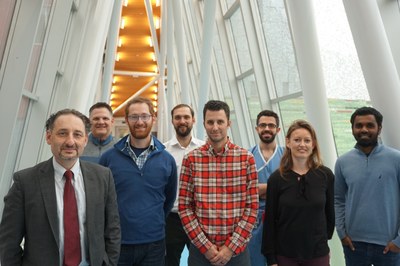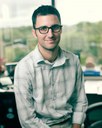Research Teams
Neurocognitive Research Group 
The Neurocognitive Research Group (NRG) is interested in the neurophysiology and cognitive functioning of the human brain in both healthy and diseased states. To that end, we pursue several research aims that encompass the measurement of human cognition, emotion, and neurophysiology. We typically ask subjects to complete behavioral tasks in the laboratory, the neurosurgical operating room, or the epilepsy monitoring unit. These behavioral computer tasks are designed to investigate circuits involved in decision-making, motor control, learning, and the representation of affective stimuli. We often target structures encountered during deep brain stimulation for the treatment of Parkinson's disease, Essential Tremor, and Tourette Syndrome, as well as subcortical (i.e. amygdala) and cortical sites in patients undergoing language localization for the treatment of epilepsy or tumor resection.
Read more:
- Focused stimulation of dorsal subthalamic nucleus improves reactive inhibitory control of action impulses.
- Dopaminergic medication shifts the balance between going and stopping in Parkinson's disease.
- The Effect of Deep Brain Stimulation Therapy on Fear-Related Capture of Attention in Parkinson's Disease and Essential Tumor: A Comparison to Healthy Individuals.
- Dopamine selectively modulates the outcome of learning unnatural action outcome associations.
- University of Louisville Psychology Department
- Vanderbilt University Medical Center (Neurology, Neurosurgery), Nashville, TN
- Vanderbilt University (Psychology), Nashville, TN
- University of Amsterdam (Psychology), Amsterdam, the Netherlands
Sports Cognition Group
Spinal Cord Injury Laboratory
The Spinal Cord Injury Lab, led by Dr. Maxwell Boakye, works to create imaginative therapies and make groundbreaking discoveries in basic, translational, and clinical research. Our research focuses on neurophysiology, neuroimaging, neurobiology, neuroplasticity, neuromodulation, and the biology of spinal cord injury systems to cure paralysis, end pain and suffering, and make a lasting difference in the health and quality of life for patients with spinal cord injury. Our goal is to positively impact the spinal cord community and accelerate the translation of neurorestorative, neuroprotective, and neuroregenerative therapies into clinical practice.
Outcomes Research Laboratory
The Outcomes Research Lab, led by Dr. Maxwell Boakye, exists to use health services research and health economics methodologies to illuminate overall trends and variations in neurosurgical care. The lab considers the cost and comparative effectiveness of alternative neurosurgical treatment options, health resource utilization, and creates predictive models of neurosurgical outcomes to develop an evidence base to guide quality improvement in neurosurgery. The Outcomes Research Lab seeks to increase overall value in neurosurgery including, but not limited to: improving the administrative processes, outcomes, neurosurgical decision making, patient health-related quality of life and satisfaction, neurosurgical population health, reduction of disparities in access to neurosurgical care and outcomes, and implementation of evidence-based policies.
Research Faculty

Brandon Ally, PhD

Nelleke van Wouwe, PhD, M.Sc.

Scott Wylie, PhD

Jessica L. Bowersock, PhD